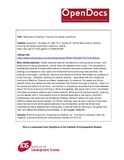Narratives of Scarcity: Framing the Global Land Rush
| dc.contributor.author | Scoones, Ian | |
| dc.contributor.author | Smalley, Rebecca | |
| dc.contributor.author | Hall, Ruth | |
| dc.contributor.author | Tsikata, Dzodzi | |
| dc.date.accessioned | 2018-06-18T09:53:39Z | |
| dc.date.available | 2018-06-18T09:53:39Z | |
| dc.date.issued | 2018-06-09 | |
| dc.identifier.citation | Scoones I.; Smalley, R.; Hall, R. & Tsikata, D. (2018) Narratives of Scarcity: Framing the Global Land Rush, Geoforum (2018), https://doi.org/10.1016/j.geoforum.2018.06.006 | en |
| dc.identifier.uri | https://opendocs.ids.ac.uk/opendocs/handle/20.500.12413/13820 | |
| dc.description.abstract | Global resource scarcity has become a central policy concern, with predictions of rising populations, natural resource depletion and hunger. The narratives of scarcity that arise as a result justify actions to harness resources considered ‘underutilised’, leading to contestations over rights and entitlements and producing new scarcities. Yet scarcity is contingent, contextual, relational and above all political. We present an analysis of three framings – absolute, relative and political scarcity – associated with the intellectual traditions of Malthus, Ricardo and Marx, respectively. A review of 134 global and Africa-specific policy and related sources demonstrates how diverse framings of scarcity – what it is, its causes and what is to be done – are evident in competing narratives that animate debates about the future of food and farming in Africa and globally. We argue that current mainstream narratives emphasise absolute and relative scarcity, while ignoring political scarcity. Opening up this debate, with a more explicit focus on political scarcities is, we argue, important; emphasising how resources are distributed between different needs and uses, and so different people and social classes. For African settings, seen as both a source of abundant resources and a site where global scarcities may be resolved, as well as where local scarcities are being experienced most acutely, a political scarcity framing on the global land rush, and resource questions more broadly, is, we suggest, essential. | en |
| dc.description.sponsorship | Economic and Social Research Council | en |
| dc.language.iso | en | en |
| dc.publisher | ScienceDirect | en |
| dc.rights | © 2018 The Authors. Published by Elsevier Ltd.. This article is available under the terms of the Creative Commons Attribution License (CC BY). You may copy and distribute the article, create extracts, abstracts and new works from the article, alter and revise the article, text or data mine the article and otherwise reuse the article commercially (including reuse and/or resale of the article) without permission from Elsevier. You must give appropriate credit to the original work, together with a link to the formal publication through the relevant DOI and a link to the Creative Commons user license above. You must indicate if any changes are made but not in any way that suggests the licensor endorses you or your use of the work. | en |
| dc.rights.uri | http://creativecommons.org/licenses/by/4.0/ | en |
| dc.subject | Agriculture | en |
| dc.subject | Climate Change | en |
| dc.subject | Development Policy | en |
| dc.subject | Globalisation | en |
| dc.subject | Rural Development | en |
| dc.title | Narratives of Scarcity: Framing the Global Land Rush | en |
| dc.type | Article | en |
| dc.rights.holder | © 2018 The Authors. Published by Elsevier Ltd. | en |
| dc.identifier.externaluri | https://www.sciencedirect.com/science/article/pii/S0016718518301751?via%3Dihub | en |
| dc.identifier.team | Resource Politics | en |
| dc.identifier.doi | 10.1016/j.geoforum.2018.06.006 | |
| dcterms.dateAccepted | 2018-06-02 | |
| rioxxterms.funder | Default funder | en |
| rioxxterms.identifier.project | Default project | en |
| rioxxterms.version | VoR | en |
| rioxxterms.versionofrecord | https://doi.org/10.1016/j.geoforum.2018.06.006 | en |
| rioxxterms.funder.project | 9ce4e4dc-26e9-4d78-96e9-15e4dcac0642 | en |
Files in this item
This item appears in the following Collection(s)
Except where otherwise noted, this item's license is described as © 2018 The Authors. Published by Elsevier Ltd.. This article is available under the terms of the Creative Commons Attribution License (CC BY).
You may copy and distribute the article, create extracts, abstracts and new works from the article, alter and revise the article, text or data mine the article and otherwise reuse the article commercially (including reuse and/or resale of the article) without permission from Elsevier. You must give appropriate credit to the original work, together with a link to the formal publication through the relevant DOI and a link to the Creative Commons user license above. You must indicate if any changes are made but not in any way that suggests the licensor endorses you or your use of the work.


